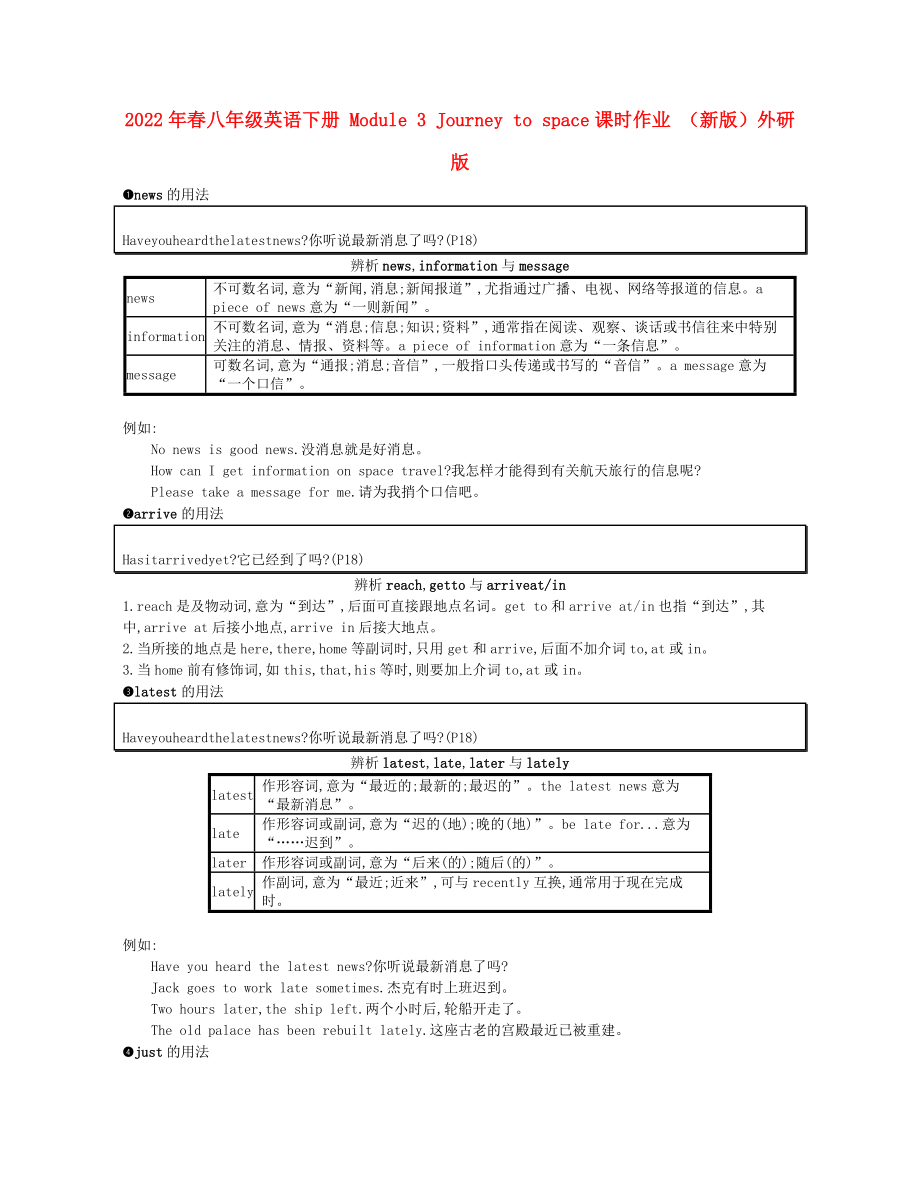《2022年春八年級(jí)英語(yǔ)下冊(cè) Module 3 Journey to space課時(shí)作業(yè) (新版)外研版》由會(huì)員分享�,可在線閱讀,更多相關(guān)《2022年春八年級(jí)英語(yǔ)下冊(cè) Module 3 Journey to space課時(shí)作業(yè) (新版)外研版(3頁(yè)珍藏版)》請(qǐng)?jiān)谘b配圖網(wǎng)上搜索�。
1、2022年春八年級(jí)英語(yǔ)下冊(cè) Module 3 Journey to space課時(shí)作業(yè) (新版)外研版
?news的用法
Haveyouheardthelatestnews?你聽(tīng)說(shuō)最新消息了嗎?(P18)
辨析news,information與message
news
不可數(shù)名詞,意為“新聞,消息;新聞報(bào)道”,尤指通過(guò)廣播��、電視���、網(wǎng)絡(luò)等報(bào)道的信息�����。a piece of news意為“一則新聞”�。
information
不可數(shù)名詞,意為“消息;信息;知識(shí);資料”,通常指在閱讀、觀察�����、談話或書(shū)信往來(lái)中特別關(guān)注的消息����、情報(bào)、資料等����。a piece of information意為
2、“一條信息”�����。
message
可數(shù)名詞,意為“通報(bào);消息;音信”,一般指口頭傳遞或書(shū)寫(xiě)的“音信”�。a message意為“一個(gè)口信”。
例如:
No news is good news.沒(méi)消息就是好消息。
How can I get information on space travel?我怎樣才能得到有關(guān)航天旅行的信息呢?
Please take a message for me.請(qǐng)為我捎個(gè)口信吧����。
?arrive的用法
Hasitarrivedyet?它已經(jīng)到了嗎?(P18)
辨析reach,getto與arriveat/in
1.reach是及物動(dòng)詞,意為“
3、到達(dá)”,后面可直接跟地點(diǎn)名詞�。get to和arrive at/in也指“到達(dá)”,其中,arrive at后接小地點(diǎn),arrive in后接大地點(diǎn)。
2.當(dāng)所接的地點(diǎn)是here,there,home等副詞時(shí),只用get和arrive,后面不加介詞to,at或in��。
3.當(dāng)home前有修飾詞,如this,that,his等時(shí),則要加上介詞to,at或in�。
?latest的用法
Haveyouheardthelatestnews?你聽(tīng)說(shuō)最新消息了嗎?(P18)
辨析latest,late,later與lately
latest
作形容詞,意為“最近的;最新的;最遲的”。the
4��、latest news意為“最新消息”���。
late
作形容詞或副詞,意為“遲的(地);晚的(地)”。be late for...意為“……遲到”����。
later
作形容詞或副詞,意為“后來(lái)(的);隨后(的)”。
lately
作副詞,意為“最近;近來(lái)”,可與recently互換,通常用于現(xiàn)在完成時(shí)�����。
例如:
Have you heard the latest news?你聽(tīng)說(shuō)最新消息了嗎?
Jack goes to work late sometimes.杰克有時(shí)上班遲到����。
Two hours later,the ship left.兩個(gè)小時(shí)后,輪船開(kāi)走了����。
The o
5����、ld palace has been rebuilt lately.這座古老的宮殿最近已被重建。
?just的用法
I’vejustmadeamodelspaceshipforourschoolproject.我剛剛為我們的學(xué)校課題制作了一架宇宙飛船模型�����。(P19)
1.just是副詞,意為“剛才;剛剛”,常用于現(xiàn)在完成時(shí)���。
2.just還可表示“正好;恰好;僅僅;不過(guò)”,相當(dāng)于only�����。例如:
Today is his birthday.He is just ten years old.今天是他的生日�。他正好10歲了����。
You just caught the train.你剛
6、好趕上火車��。
I rang up just to say hello.我打電話只是問(wèn)候一下。
3.辨析just,just now與just then�。
(1)just意為“剛剛”時(shí),常和現(xiàn)在完成時(shí)連用,一般位于助動(dòng)詞之后,行為動(dòng)詞之前。例如:
I have just finished lunch.我剛吃過(guò)午飯����。
(2)just now意為“剛才;一會(huì)兒之前”,常與一般過(guò)去時(shí)連用,位于句首或句末。例如:
They gave it to me just now.剛才他們把它給了我�。
?none的用法
Noneofthemhasanenvironmentlikethatofthe
7、earth.它們中沒(méi)有一顆(行星)有像地球那樣的環(huán)境��。(P20)
辨析none與noone
none
(1)意為“沒(méi)有一個(gè)”���。既可指人,又可指物,可與of連用�����。
(2)①none of與可數(shù)名詞復(fù)數(shù)連用作主語(yǔ)時(shí),謂語(yǔ)動(dòng)詞用單復(fù)數(shù)形式均可。
②none of與不可數(shù)名詞連用作主語(yǔ)時(shí),謂語(yǔ)動(dòng)詞用單數(shù)形式�。
(3)常用于回答how many/how much引起的疑問(wèn)句。
no one
(1)意為“沒(méi)有人”�。只可指人,不可指物,不能與of連用。
(2)作主語(yǔ)時(shí),謂語(yǔ)動(dòng)詞用單數(shù)形式���。
(3)只能回答who開(kāi)頭的問(wèn)句�����。
例如:
—How many boys are there
8�����、 in the room?房間里有多少個(gè)男孩?
—None.一個(gè)也沒(méi)有����。
—Who is in the room?誰(shuí)在房間里?
—No one.沒(méi)人。
?group的用法
...andoursolarsystemisasmallpartofamuchlargergroupofstarsandplanets...……我們的太陽(yáng)系是一大群恒星和行星中的一小部分……(P20)
1.group是可數(shù)名詞,常構(gòu)成短語(yǔ)a group of,意為“一群;一組”,其后只能接可數(shù)名詞復(fù)數(shù)���。
2.a group of后面加復(fù)數(shù)名詞時(shí),謂語(yǔ)動(dòng)詞用復(fù)數(shù)形式;而a pair of/a piece of
9���、等后面加復(fù)數(shù)名詞時(shí),謂語(yǔ)動(dòng)詞用單數(shù)形式;“數(shù)詞+pair(s) of”在句中作主語(yǔ)時(shí),謂語(yǔ)動(dòng)詞要與pair的單復(fù)數(shù)形式保持一致。例如:
A group of students are running on the playground.一群學(xué)生正在操場(chǎng)上跑步���。
Three pairs of jeans are in the bag.包里有三條牛仔褲�。
3.in groups意為“成群結(jié)隊(duì)地;以小組為單位”����。例如:
Do you teach your students singly or in groups?你教學(xué)生是單個(gè)教還是按組教?
?municate的用法
Whyhasnoonemunicatedwithus?為什么沒(méi)有人和我們交流?(P20)
1municate作不及物動(dòng)詞時(shí),意為“聯(lián)系;交流”。municate with sb.意為“和某人溝通/交流/通話”���。
2municate作及物動(dòng)詞時(shí),意為“傳達(dá);傳遞”��。municatesth. to sb.意為“把某事傳達(dá)給某人”����。例如:
People now municate greetings to each other by email or by mobile phone.人們現(xiàn)在使用電子郵件或手機(jī)傳遞問(wèn)候。
 2022年春八年級(jí)英語(yǔ)下冊(cè) Module 3 Journey to space課時(shí)作業(yè) (新版)外研版
2022年春八年級(jí)英語(yǔ)下冊(cè) Module 3 Journey to space課時(shí)作業(yè) (新版)外研版

